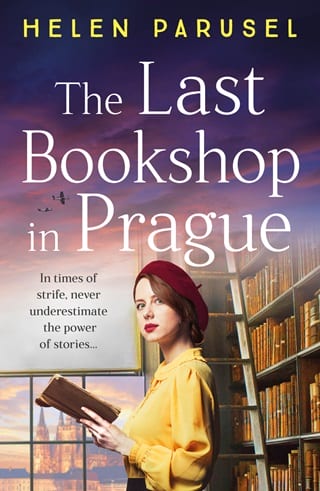Chapter 8
8
He was here again. That policeman, Captain Kovar. Only this time, in civilian clothes. Jana was kneeling in the front shop window rearranging the book display when she glanced up to see his face, cheeks reddened from the cold, peering in at her from the other side of the glass. One corner of his mouth lifted slightly, as if in an embarrassed smile for being caught out watching her, but it disappeared instantly when she glared back at him. He stepped back from the window and shuffled around on the pavement. Annoyed at being interrupted, she crawled out backwards and stood up, pulling down her dress that had become hitched up on her woollen stockings.
What did he want now? She waited impatiently for him to enter the shop. When he still hung around outside in the grey, frozen air, she moved to the cash register and stabbed a stray cash slip onto the long spike that held the record slips of book sales. There weren't many. Maybe he hadn't intended to come into the shop but had just stopped to look through the window. No doubt found it amusing to find her scrabbling around on her hands and knees. She huffed to herself and looked at the door .
Finally, it opened and he stepped inside, his stride less assured out of uniform. He approached her, removing his brown fedora and held it against the breast pocket of his coat.
Running a hand over his hair – it looked freshly washed, a glossy black – he greeted her.
‘Good afternoon, Captain Kovar,' she replied. ‘What can I do for you?'
‘My mother's birthday is coming up and I'm looking for a book for her.'
‘Czech or German?'
‘Czech.'
‘New or second hand?'
He looked around the empty shop as if assessing the lack of business.
‘New,' he said.
‘Well, since most new Czech books are banned or discouraged, the choice is limited.'
She moved out from behind the cash desk, saying, ‘I'll show you what we have,' and led him to a section of bookshelves towards the back of the shop. New instructions dictated the front of the shop be kept for German titles. ‘What type of books does your mother like to read?'
He paused for a moment, his forehead wrinkling.
‘Hmm, maybe you can recommend something? What does your mother enjoy?'
‘Nothing. She's dead, Captain Kovar.' Even Jana was shocked at her hard burst of bitterness, and she regretted her harsh tone instantly.
His eyes widened in surprise.
‘I'm sorry to hear that.' He looked at her with a dismayed expression.
Pressure built in her chest and she fought back the tears. Why had she said that? She fingered the small, gold book that hung just below her neck, visible at the opening of her blouse. Kovar's eyes lingered a moment on the locket.
A long awkward, silence followed.
Then, her voice softer now, she said, ‘It was a couple of years ago.'
He waited.
‘She'd been a nurse in the Great War and contracted TB. She suffered from ill health after that, one chest infection after another. Then one winter, she caught flu which turned to pneumonia and she passed away within two days.'
He gave a slow, thoughtful nod. Again, he said, ‘I'm sorry.'
Why had she just told him all this? She didn't owe him an explanation. She gave herself a mental shake and pressed back her shoulders.
‘How about a family saga?' she said, lifting her voice.
Captain Kovar seemed grateful for the change of subject and looked at the books she suggested. The tension between them eased as they discussed the titles; he knew more about literature than she had expected and they fell into easy conversation. His expression had lost its arrogance and as she observed his high cheek bones and strong chin, she acknowledged his good looks.
He caught her studying him and gave her a warm smile. Annoyingly, her stomach fluttered.
She swallowed. This seemed like a good time to bring up what had been bothering her for days.
‘You saw him, didn't you? Why didn't you denounce him?'
He stiffened. ‘I'm not sure that I quite understand you.'
‘You opened the curtain under the sink, saw him and closed it again. Why?'
‘I'm afraid you're mistaken. I have no idea what you're talking about.' His expression had turned hard, their companiable conversation from a few moments ago shattered. ‘I'll take this one,' he said, pulling a random book from the shelf and strode towards the cash desk.
He paid in silence, gave a curt goodbye and put on his hat. Jana stared after him as he walked out into the street. She was disappointed. She'd wanted to hear that he was one of them, a good Czech, a humane policeman who would not betray a young boy because of his religion. Because of what the Nazis demanded. But now she was confused.
Had Michal made a mistake that Kovar had seen him? Was Captain Kovar, in reality, an enemy? A collaborator? If so, she had just made herself look very suspicious, as well as putting Michal in possible danger.
As she approached the bookshop on her return from working at the castle, Jana saw a slightly built man wearing a worn coat and a cloth cap standing outside. It was unusual to have a customer so early. She smiled at him and asked if he was waiting for her to open up. He answered that he was and, after she had unlocked the door, followed her inside. Whilst she bustled around, removing her coat, turning on lights and lighting the stove, the man browsed the shelves.
Jana moved to the cash register and inserted a small key into the side of the machine and pulled down the handle. There was a ping and the cash drawer opened. She counted the small amount of change. All was correct.
When she looked up, she found the man standing before her; he was young with pale skin and intense, black eyes.
‘How can I help you?'
For some reason, he made her feel uneasy as he checked over his shoulder before speaking. ‘"Our true nationality is mankind."'
Jana froze. The words he'd just uttered were a quote from H. G. Wells. But it wasn't the fact that the man had quoted a banned author that startled her; it was the fact that it was the code Lenka had told her to expect from her contact.
Jana's heart thudded as she gave the required reply, a quote from the Jewish, Czech author, Franz Kafka. ‘"God gives us the nuts but he does not crack them.'"
He gave a brief, thin smile and took a step closer to the cash desk.
‘I presume you have a copy of The Gardener's Year by Capek.' She gave a nod and he continued. ‘Messages will be a series of numbers coded to align with words and letters in the book. The first two numbers are the page number…'
Jana hardly breathed as she took in his words; this couldn't be happening. It was like something she would read in a book; not a real event in which she was involved. Concentrating hard, she memorised the code and repeated it back to him.
Nodding his approval, he handed her a slip of paper. ‘It's your first assignment. Destroy when you have decoded the message.'
Her hand trembled as she took the note from him.
‘How do I reply?'
‘In the same code. It's best that you hide the note in something when you hand it to your contact.' He looked down at her handmade bookmarks displayed on the counter.
She nodded her understanding.
‘How will I know the contact?'
He recited a quote and turned to leave just as the door opened and the first customer of the day entered.
Before locking up the shop that evening, Jana took the book The Gardener's Year and a handful of her handmade bookmarks. Then she climbed the stairs and let herself into the apartment. Luckily, her father was still working in the attic so she could start to decode the message without being disturbed.
Sitting cross-legged on her bed, she flipped through the pages, noting down the appropriate letters until the message appeared: she was to note the exact arrival times of Heydrich at Salm Palace each day. An easy enough job, she thought as she went to the kitchen sink, struck a match and set light to both her translation of the code and the coded message of numbers.
She returned to her room and cut a piece of notepaper to slightly less than the width of her bookmarks. Then she started painstakingly to compose her message, keeping it as concise as possible, writing her list of numbers with precision. Her coded note read:
HH talks of imminent deportation.
She then chose a bookmark she had made recently – floral fabric stitched over a piece of card, a golden tassel hanging from the top. She reached under her bed for her sewing basket and took out a tiny pair of scissors which she used to carefully slit open the stitches at the bottom of the bookmark. Once the fabric was free, she eased her note inside and then restitched the fabric. She sat back to admire her handiwork and smiled, pleased with herself.
An innocent bookmark. Mama would've been proud of her venture.
We'll show them Mama. They can burn and ban our books, but we won't be silenced.
 Fullepub
Fullepub 



